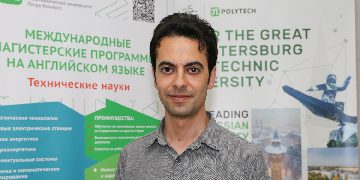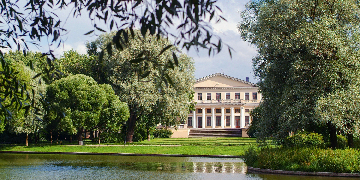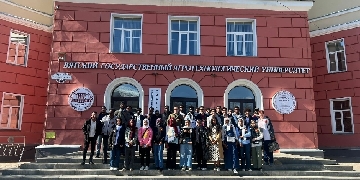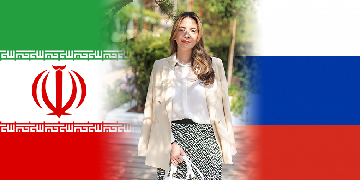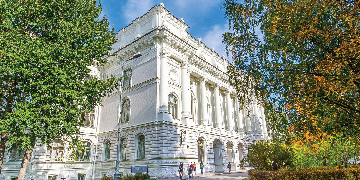It is hardly an exaggeration to say that the image of Russia and Russians in the minds of Iranians has been developed mainly under the influence of mass media and the Western pop culture products. And this fact mainly explains why well-known stereotypes are so widespread, including lands covered by permanent snow, bears with balalaikas in the streets, the exaggerated grimness and unfriendliness of Russians. The HED editorial staff believes that immersion in Russian culture, literature and art can help dispel many false beliefs and, probably, see that we are not that different.
Today our magazine starts a new column “Cultural Code” where we will tell you about art, literature, history, traditions and cultural diversity of Russia.
Over the last years, there has been a considerable revival of Iranians’ interest in Russian literature. This is evidenced by an increased number of original Russian-language texts translated into Persian (Farsi) and the fact that Russian names are consistently ranked among the most read authors. Interestingly, Iranian readers get access not only to Russian classical literature included in the global collection but also to the books of different genres by contemporary authors.
Tolstoy, Dostoevsky, Chekhov, Pushkin, Lermontov, Iskander, Zamyatin have become very popular authors among Iranians. According to the Head of the Russian Center of Tehran University, translator Zahra Mohammadi, Chekhov has been the most read foreign author in Iran for five years in a row.
As noted by the literary scholars and translators, the content and spirit of Russian literature are very congenial to Iranians, and readers will inevitably open their hearts to it. Moral search and choice, self-sacrifice, sympathy and compassion, comprehension of the role of personality in society – all of this unites Iranian and Russian readers. The masterpieces of Russian classical literature are more or less known to a great many people, but the situation with the works written in the 20th and 21st centuries is quite different. We have done a review of the books of different genres and by different authors united by Russian as the language of their works.
Arkady Strugatsky, Boris Strugatsky
Roadside Picnic
fantastic fiction
The Zone is an altered space where neither people nor animals can live. Anyone who visits the Zone undergoes invisible changes and transmits them to their children in the form of unforeseeable anomalies. Artifact hunt (stalking) is profitable business for those who are so lucky to come back. The main character of the novel is Redrick Schuhart, a young stalker who plunges, despite innumerable dangers, into adventure searching for mysterious extraterrestrial artifacts. Enchanted by the Zone, he returns there again and again, estranging himself from his loved ones and facing a moral dilemma.
Vladimir Arsenyev
Dersu Uzala
adventures
This is a story of the Ussuriland expedition inspired by real events. The Russian scholar and writer Vladimir Arsenyev heading an expedition to the wild pristine taiga meets Dersu Uzala, a local resident. The novel sets readers off on a journey to the vast expanses of the Russian Far East and acquaints them with the region’s nature, people living there, numerous legends and ceremonies. The novel ranks among the best adventure books. The famous Japanese filmmaker Akira Kurosawa directed the same-name movie in 1975.
Ilya Ilf, Yevgeny Petrov
The Little Golden Calf
satirical novel
This is a satirical novel about the adventures of charismatic schemer and crook Ostap Bender. It is included in the golden collection of Russian literature. The action takes place against the backdrop of Soviet mundanity of the 1930s and is a bright parody of reality. A combination of realism and such literary techniques as hyperbole, pun, grotesque produced a facetious story with multiple meanings. In 1949-1956, the novel was called ideological sabotage and banned.
Yevgeny Zamyatin
We
dystopian novel
This is a classical dystopian novel, a black comedy masterpiece that influenced the works by Aldous Huxley, George Orwell, Vladimir Nabokov, Kurt Vonnegut. There are no people in the One State, only numbers. The society of nameless people is under total and strict control of the almighty ruler called the Benefactor. Emotions and instincts must be suppressed, and people must live according to the regulations and standards for the benefit of the One State. The mathematical genius, one of the Integral spaceship constructors, meets a woman by chance, which leads to unintended consequences – he discovers an ancient disease which was called a soul back in the old days.
Anna Akhmatova
Grey-eyed King
poetry
This is a book of poems by one of the most outstanding Russian women poets. This is very feminine, heart-felt, emotional and intimate lyric poetry that touches everybody’s heart. Anna Akhmatova, a classic of the Russian poetry of the Silver Age, was short-listed for the Nobel Prize in Literature twice. The woman with a difficult fate and a talent to delicately convey the most complex feelings by words and make the reader a co-present witness. The book of poems translated by Shapur Ahmadi gives readers the opportunity to immerse themselves in the wealth of Russian lyric poetry which is in sync with Iranian hearts.
Kir Bulychev
Alisa’s Voyage
children's fantastic fiction
This is the most famous book in the science fiction series about Alisa Selezneva, a girl who goes on an exciting journey with her father, a famous space zoologist. In this book, Alisa will take part in an amazing expedition aimed at finding animals on other planets for the Moscow Zoo. The main characters will face strange events, a fierce clash with space pirates, and the riddles to be solved by all means. The book is considered an iconic piece of children's fantastic fiction.
Boris Vasilyev
The Dawns Here Are Quiet
war prose
This is a poignant example of the Soviet war prose, which is dedicated to the courage and bravery of the Soviet women who protected their Motherland from fascist invaders on equal terms with the men. There were six against sixteen. The eventful plot developing around the confrontation of five artillery girls and their commander, Fedot Vaskov, with the enemy sabotage group holds us in suspense until the very end. Philosophical contemplation about war, humans, moral choice and death makes the book a landmark work of the war and post-war Russian literature. The same-name movie was made in 1972, which has won the love of numerous viewers all over the world.
Mikhail Bulgakov
The Master and Margarita
novel
Without exaggeration, this is a great work included in the golden fund of world literature. This is a surrealist novel about the great power of love capable of overcoming all obstacles, if this love is true. The multilayered plot develops against the background of the Moscow streets and interiors with multiple senses. Everything is in confusion on the pages of the timeless book: good and evil, fate and will, crime and punishment, love and infernal cynicism. The novel is considered unfinished, and Bulgakov’s drafts were edited by his wife Elena after his death.
06.06.2023



